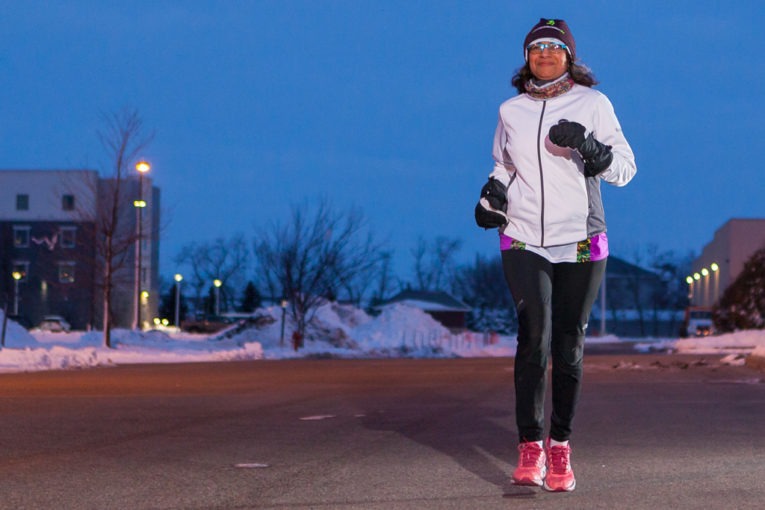When Anu Gaba, M.D., and her family moved to Fargo, North Dakota, in June 2004, just after the inaugural Fargo Marathon, they kept hearing so much about the race that they started running as a family.
Dr. Gaba first started running the 5K and has been running the full marathon since 2014. This year will be her fifth Fargo Marathon. Her husband has been running the marathon since 2005 and her daughters have done various races, too.
Gaba says running has many advantages.
“It’s such a great way to be outside and to know a community outside of work. It is also a good way for us to have an event as a family. Whenever we go and visit other towns, whether it was looking for colleges for our older daughter, all of us run together there. It’s a good way to see a town when you’re running. If you walk, it’ll take too long. If you go by car, you don’t see much. By running, you can see the town much faster and you’re on your feet,” she said.
Gaba, who specializes in hematology and medical oncology, helps those with blood diseases and cancer at the Sanford Roger Maris Cancer Center.
“I’m grateful I’m able to run because there were times when I was injured and couldn’t run. I think of my patients, too. They put their all into their chemotherapy treatments, and they are struggling. I think of their persistence and perseverance. I remember one patient telling me he had a tough time breathing, and he said, ‘I feel like I’m running a marathon, I’m breathing so hard.’ So, when I’m struggling with a run or wearing out, I tell myself this is nothing compared to what my patients go through. Whatever suffering I’m going through, it’s nothing in comparison to them. I think that’s such a big motivator for me,” Gaba says.
It helps her as a physician, being physically active and running. She is part of a running group called Faster Stronger Runner.
“That definitely helps. It gives me more friends. I have another smaller group of friends where we do cross-training during the week at the Y, or we do our shorter runs together at the Fargo Running Company,” she says.
“I really think it’s great that Sanford as a health institution is partnering with the Fargo Marathon. I think we’re encouraging physical fitness. I feel that health care institutions and doctors and nurses, we’re always looked at as the problem‑solvers, not the problem-preventers. It is so much better if we can prevent the problem from occurring. It does send an excellent message for Sanford to be a part of running.”
Gaba has tips for a good diet.
“I try to control my portions. When you take a big plate, you’ll fill the big plate. If you take a small plate, you’ll fill a small plate. So try to use a smaller plate, and then definitely always make sure you have some fresh vegetables as part of your meal. If you are going to have dessert, make sure it’s half the dessert, not the full amount. Whatever you eat, cut down on the sugar. That is so important. And, you know, it’s not necessary to eat a lot of meat to be a runner. You can get an adequate amount of protein even by following a vegetarian diet,” she says.
Gaba doesn’t listen to music when she runs, because she wants to be aware of her surroundings.
“Usually, I’m running with friends, and we’re talking. It’s a great way to develop camaraderie and friendship, and I think I know more about my friends than their spouses, because you’re spending so many hours together! Also, Fargo is beautiful, whether it’s winter or summer. And for safety reasons. I want to make sure that I’m listening to any honks or cars or anything that’s close by. I know where I’m running. I’m concentrating on where I’m putting my foot. I don’t want to hurt myself,” she says.
“When I first started running, I did the run/walk method. I would run for five minutes, walk for one minute, run for four minutes, walk for one minute. I did that for my first three marathons. I gradually grew confident enough that I can run the whole thing. That’s what I do now. Marathons are much more difficult, too, as we end the race. It’s the last five miles that can make or break you. Start off at a reasonable pace, don’t get too excited about the beginning of the marathon and wear yourself out. Keep a steady pace throughout.
“I’ve always told myself, the harder we work, the better the reward. I look forward to the end goal of finishing the run, and I know that the better I run, the more satisfied I will feel. Every time I run, I’m just so thankful that I’m able to do it.”
More
- Hip fatigue solutions
- 5 ways to reduce over-striding
- Running and emotion: Accumulating miles to ease anxiety
…
Posted In Health Information, Healthy Living, Orthopedics, Running
